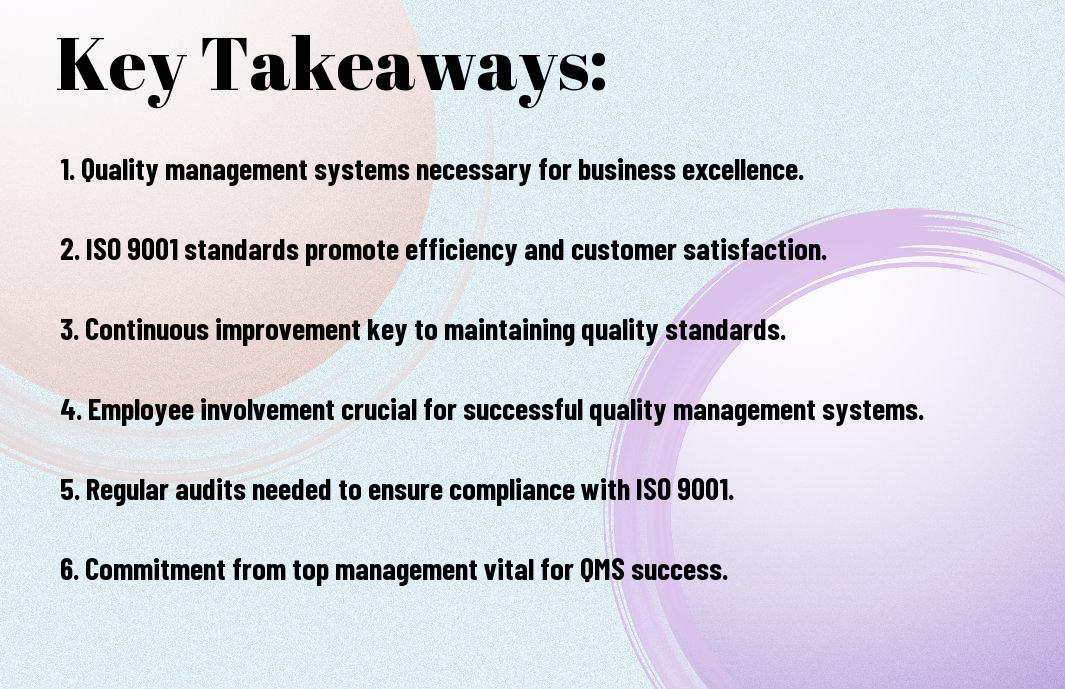Ensuring Excellence – Mastering Quality Management Systems & ISO 9001 Standards in Today’s Business
Table of Contents
You may also interested:
TL;DR: Mastering Quality Management Systems & ISO 9001 Standards
- Understanding ISO 9001 Standards: Familiarize yourself with the requirements and principles of ISO 9001 to implement an effective quality management system.
- Commitment & Leadership: Gain top management’s commitment and involvement in the QMS implementation process to ensure the organization’s success.
- Continuous Improvement: Embrace a culture of continuous improvement to enhance processes, products, and overall performance within the organization.
- Monitoring & Measurement: Regularly monitor and measure key performance indicators to track the effectiveness of the QMS and identify areas for improvement.
- Employee Involvement: Engage employees at all levels in the quality management process to build a sense of ownership and empowerment for quality initiatives.
Most businesses strive for excellence in their operations, and a key element in achieving this is mastering Quality Management Systems (QMS) and adhering to ISO 9001 Standards. These standards provide a framework that ensures consistency, efficiency, and customer satisfaction in all aspects of an organization. In today’s competitive business environment, organizations that prioritize quality management are better positioned to succeed and thrive. To dive deeper into how you can achieve excellence through ISO 9001, visit Achieving Excellence with ISO 9001 Quality Management Systems.

Fundamental Principles of Quality Management
Customer Focus and Satisfaction
Satisfaction of customers is paramount in quality management systems. Understanding and meeting customer expectations is crucial for business success. By focusing on customer needs, businesses can continually improve their products and services, ultimately resulting in higher levels of customer satisfaction and loyalty.
Leadership and Commitment
Quality leadership plays a vital role in implementing and maintaining a successful quality management system. Leaders must demonstrate a strong commitment to quality by setting clear goals, providing resources, and encouraging employee involvement. Commitment from top management fosters a culture of quality throughout the organization, driving continuous improvement and sustainable success.

Implementing ISO 9001 in Your Business
Understanding the Requirements
Many businesses aim to achieve excellence in quality management by implementing ISO 9001 standards. To do so, it is crucial to understand the requirements outlined in the standard. ISO 9001 sets forth a framework for a quality management system that can be implemented by any organization, regardless of its size or industry.
Steps for Effective Implementation
Any business looking to implement ISO 9001 effectively should follow a systematic approach. This includes conducting a gap analysis to assess current processes and identify areas that need improvement, creating a quality manual and relevant documentation, providing adequate training for employees, and establishing key performance indicators to measure the effectiveness of the quality management system.
Implementing ISO 9001 in your business can lead to significant improvements in product quality, customer satisfaction, and operational efficiency. It can enhance your reputation with customers and stakeholders, increase employee morale and engagement, and ultimately drive business growth. However, it is important to approach the implementation process with diligence and commitment to ensure long-term success.

Maintenance and Continual Improvement of Quality Management Systems
Monitoring and Measuring Performance
To ensure ongoing excellence in quality management systems, monitoring and measuring performance is crucial. This involves setting key performance indicators (KPIs) and regularly assessing processes against these benchmarks. Corrective actions should be promptly taken if any deviations are identified, ensuring that the system continually operates at peak efficiency.
Sustaining Improvement Over Time
To sustain improvement over time, organizations must cultivate a culture of continuous learning and adaptation. Regular training and development opportunities for employees can help them stay abreast of best practices and emerging trends in quality management. Employee empowerment and engagement are also key factors in driving sustained improvement, as they foster a sense of ownership and accountability within the workforce.
It is imperative for organizations to recognize that quality management is not a one-time effort but a journey of continuous enhancement. Regular audits and reviews of the quality management system can help identify areas for improvement and ensure compliance with ISO 9001 standards. By prioritizing open communication and feedback mechanisms within the organization, companies can proactively address issues and drive sustained improvement over time.
Navigating Certification and Beyond
The Certification Process
Despite the rigorous nature of the certification process, obtaining ISO 9001 accreditation is a crucial step for businesses looking to demonstrate their commitment to quality management. With thorough documentation, implementation of quality management systems, and regular audits, organizations can ensure compliance with ISO standards and ultimately improve efficiency and customer satisfaction.
Leveraging ISO 9001 for Competitive Advantage
One of the key benefits of ISO 9001 certification is the ability to leverage it for a competitive advantage in the market. By aligning business processes with ISO standards, companies can enhance their reputation, increase market share, and attract new customers who prioritize quality assurance. Implementing ISO 9001 also fosters a culture of continuous improvement, leading to higher productivity and profitability.
Beyond simply achieving certification, organizations must continuously strive to improve their quality management systems to stay competitive in today’s business landscape. By embracing a proactive approach to quality assurance and constantly seeking ways to enhance processes, companies can not only maintain their ISO 9001 status but also drive sustainable growth and success.
FAQ
Q: What is a Quality Management System (QMS)?
A: A Quality Management System (QMS) is a set of policies, processes, and procedures required for planning and executing quality production and services in an organization. It helps ensure consistency and improvement in products or services to meet customer requirements.
Q: What is ISO 9001?
A: ISO 9001 is an international standard that specifies requirements for a Quality Management System (QMS). It helps organizations demonstrate their ability to consistently provide products and services that meet customer and regulatory requirements.
Q: Why is mastering ISO 9001 important for businesses?
A: Mastering ISO 9001 is important for businesses as it helps enhance customer satisfaction, improve processes, and drive continual improvement. It also enhances the organization’s credibility and competitiveness in the market.
Q: What are the key principles of ISO 9001?
A: The key principles of ISO 9001 include customer focus, leadership, engagement of people, process approach, improvement, evidence-based decision making, and relationship management. These principles guide organizations in achieving quality objectives.
Q: How can businesses ensure excellence in mastering Quality Management Systems and ISO 9001 standards?
A: Businesses can ensure excellence by establishing a strong quality culture, providing necessary training to employees, conducting regular audits to identify areas for improvement, and actively engaging in continuous learning and adaptation to changing business environments.





